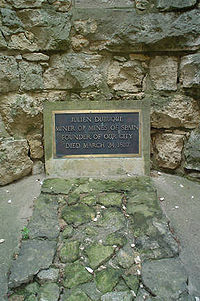
Julien Dubuque
Encyclopedia
Julien Dubuque was a French Canadian
from the area of Champlain, Quebec
who arrived near what now is known as Dubuque, Iowa
- which was named after him. He was one of the first men to settle in the area. He initially received permission from the Meskwaki
Native American
tribe to mine the lead in 1788. Subsequently the Spanish confirmed that by giving him a land grant in 1796.
Once he had received permission from the Meskwaki to mine lead, Julien Dubuque remained in the area for the rest of his life. He befriended the local Meskwaki Chief Peosta - for whom the nearby town of Peosta, Iowa
is named. It is widely believed that Dubuque married Peosta's daughter, who was supposedly named "Potosa"; however, there is no evidence that this was ever the case. Those who back the marriage claim point to letters that mention a Madame Dubuque as meaning Dubuque's wife.
After his death, the Meskwaki built a log crypt for Dubuque; which was replaced in the late 19th century by an imposing stone monument.
The name "Potosa" often appears in fanciful origin stories for the name Potosi, a small Wisconsin town located north of Dubuque, Iowa, which was founded in the 1830s as a lead-mining settlement.
When what would eventually become Iowa was opened up to European settlement, the settlement in the area where he had mined was named after him. It was known by several names, including DuBuque's Mines. Eventually, the village became the first city in Iowa, and was named Dubuque in memory of Julien Dubuque. Dubuque's resting place and memorial lie on a cliff facing the Mississippi river at the Julien Dubuque Monument in the Mines of Spain State Recreation Area and E. B. Lyons Nature Center
.

French Canadian
French Canadian or Francophone Canadian, , generally refers to the descendents of French colonists who arrived in New France in the 17th and 18th centuries...
from the area of Champlain, Quebec
Champlain, Quebec
Champlain is a municipality in the Mauricie region of the province of Quebec in Canada.-Demographics:Population trend:* Population in 2006: 1566 * Population in 2001: 1623* Population in 1996: 1608...
who arrived near what now is known as Dubuque, Iowa
Dubuque, Iowa
Dubuque is a city in and the county seat of Dubuque County, Iowa, United States, located along the Mississippi River. In 2010 its population was 57,637, making it the ninth-largest city in the state and the county's population was 93,653....
- which was named after him. He was one of the first men to settle in the area. He initially received permission from the Meskwaki
Meskwaki
The Meskwaki are a Native American people often known to outsiders as the Fox tribe. They have often been closely linked to the Sauk people. In their own language, the Meskwaki call themselves Meshkwahkihaki, which means "the Red-Earths." Historically their homelands were in the Great Lakes region...
Native American
Native Americans in the United States
Native Americans in the United States are the indigenous peoples in North America within the boundaries of the present-day continental United States, parts of Alaska, and the island state of Hawaii. They are composed of numerous, distinct tribes, states, and ethnic groups, many of which survive as...
tribe to mine the lead in 1788. Subsequently the Spanish confirmed that by giving him a land grant in 1796.
Once he had received permission from the Meskwaki to mine lead, Julien Dubuque remained in the area for the rest of his life. He befriended the local Meskwaki Chief Peosta - for whom the nearby town of Peosta, Iowa
Peosta, Iowa
Peosta is a city in Dubuque County, Iowa, United States, and an exurb of the city of Dubuque. It is part of the Dubuque, Iowa Metropolitan Statistical Area. The population was 1,377 in the 2010 census, an increase of 111.5% from 651 in the 2000 census...
is named. It is widely believed that Dubuque married Peosta's daughter, who was supposedly named "Potosa"; however, there is no evidence that this was ever the case. Those who back the marriage claim point to letters that mention a Madame Dubuque as meaning Dubuque's wife.
After his death, the Meskwaki built a log crypt for Dubuque; which was replaced in the late 19th century by an imposing stone monument.
The name "Potosa" often appears in fanciful origin stories for the name Potosi, a small Wisconsin town located north of Dubuque, Iowa, which was founded in the 1830s as a lead-mining settlement.
Dubuque's Legacy
Julien Dubuque is remembered as the first European to settle in what would become the state of Iowa. He is remembered as a friend of the Native Americans in the area and a champion of their cause. Dubuque was also a generous man who spent lavishly on many friends - this had the unfortunate effect of keeping him in debt during the later part of his life.When what would eventually become Iowa was opened up to European settlement, the settlement in the area where he had mined was named after him. It was known by several names, including DuBuque's Mines. Eventually, the village became the first city in Iowa, and was named Dubuque in memory of Julien Dubuque. Dubuque's resting place and memorial lie on a cliff facing the Mississippi river at the Julien Dubuque Monument in the Mines of Spain State Recreation Area and E. B. Lyons Nature Center
Mines of Spain State Recreation Area and E. B. Lyons Nature Center
The Mines of Spain State Recreation Area and E. B. Lyons Nature Center is a state park in Dubuque County, Iowa, USA. It is near Dubuque, the eighth-largest city in the state...
.
External links
Other Images


